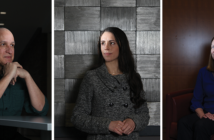Residents get a rare, eye-opening glimpse of their patients’ lives by visiting them at home.
In the age of 15-minute patient visits and compressed scheduling, it almost seems inconceivable for a physician to entertain thoughts of seeing a patient in his or her home. Yet the lessons gleaned from just one such visit could affect the patient’s care for years to come. Seeing the realities of poverty, family dynamics, and environment could influence many recommendations or interventions a doctor prescribes.
During the General Internal Medicine residency program at Rhode Island Hospital, directed by Associate Professor of Medicine Kelly A. McGarry, MD, residents step outside the Medical Primary Care Unit where they see some 15,000 patient visits per year, most of them with the underserved. They choose one patient, usually someone whom they would describe as “challenging” or “psychiatrically complicated,” who has a hard time adhering to treatment or maintaining regular appointments. With the support of their team, the residents visit the patient in his or her home as a group.
The experience is profound, says Clinical Professor of Psychiatry and Human Behavior and Medicine Carol Landau, PhD. Landau is co-chair of the Psychiatry and Psychology in Primary Care Curriculum, and meets weekly with the residents. This is a key part of their training, since most people with psychiatric and behavioral medicine needs are seen by their primary care providers, not by mental health professionals. She oversees the process of selecting and setting up home visits. In groups, she and the residents have visited houses, apartment buildings, and public housing all over greater Providence, and even Rhode Island’s Adult Correctional Institution (ACI).
Division of General Internal Medicine Chief Angela Caliendo, MD, who is also vice chair of the Department of Medicine, says: “Our goal is to provide residents with a broad and meaningful experience in primary care during their training, with hopes of igniting their passion for clinical practice. The impact of house calls and other innovative programs is likely contributing to our success in having residents pursue careers in primary care.
To help the residents process the home visit experience, Landau and her co-chair, Associate Professor of Psychiatry and Human Behavior and Medicine (Clinical) Colin Harrington, MD, use a narrative medicine tool: reflective writing. Immediately after leaving the home, the residents write a short, stream-of-consciousness-type reflection that captures their observations and feelings about the visit.
Landau says the reflections help the residents accept what pediatrician Sayantani DasGupta, MD, MPH calls “narrative humility.” In an article in The Lancet in 2008, DasGupta wrote:
Narrative humility acknowledges that our patients’ stories are not objects that we can comprehend or master, but rather dynamic entities that we can approach and engage with, while simultaneously remaining open to their ambiguity and contradiction, and engaging in constant self-evaluation and self-critique about issues such as our own role in the story, our expectations of the story, our responsibilities to the story, and our identifications with the story …
During a home visit, many barriers to communication can be overcome, Landau says. “Our residency program emphasizes accurate empathy and the physician-patient relationship. The home visit-narrative experience allows residents first to experience and then take some time to reflect on the patient’s story—the multiple factors that affect the patient outside the exam room. A patient who might first be viewed as ‘non-compliant’ or a ‘poor historian’ for one reason or another is transformed into an individual who is actually resilient and trying to cope with the most desperate of circumstances.” Sometimes the residents are struck by the poor housing conditions, noise, crowding, and even safety issues they see. By sharing the narratives, Landau says, “we reach a deeper understanding of our cognitive and affective reactions.”
The effect extends beyond the individual patient. Julia Jacobs, MD RES’12, who is now a hospitalist in Tennessee, saw a patient at the ACI. “I think about that day more than any one patient I saw in residency,” Jacobs says. “When I see anyone in the hospital now who has served time, I feel a deeper understanding. … I know my experience helps me serve that patient better.
The following pieces are reflections written by residents after home visits.
Marie
By Megha Garg, MD RES’
I met the most remarkable woman today.
Marie has endured everything: sexual and physical abuse by her father, abandonment by her mother, chronic illness, unemployment. Her husband left decades ago. She had a glimmer of hope earlier in life when she started college, but the rest of life sidetracked her. Now, on her worst of days, she has to figure out how to stretch their food so that she and her two sons can eat one meal for the day. She prioritizes the rent for her Section 8 housing apartment so they don’t end up on the streets. It is a diminutive home for three adults, with a lawn full of cigarette butts, rickety stairs, thin walls, and mentally ill neighbors whose lives can be heard all the time through those thin walls. She is afraid of being alone, even for a moment. It causes her to have a panic attack. She relies on her sons to keep her company; they do not have jobs or contribute to the household chores. She often misses her doctors’ appointments because it takes time away from dealing with all the other problems she faces. Her life is insufferable.
“I don’t have any plans to hurt myself,” she said. “But I don’t feel like living like this anymore.”
Yet, she welcomed us into her home. She showed us her world and articulated so beautifully the details of her life, her anger and frustration at the unfair hand she’s been dealt. What struck me most were her expressions of forgiveness. “I didn’t deserve to be treated like that, but I get why he did it,” she said of her father. She was able to stand outside of herself and observe her world.
“I don’t expect to not have any problems,” she said. “But I think everyone should be able to have moments of peace.”
So, what does Marie want, amid all of these problems, more than anything else?
Not more money or more things. Not even a better apartment.
“Purpose.”
Marie wants to have the strength and ability to go read to kids. Or work with the elderly. Meaning. Because that would “allow me to get through everything else.”
Marie isn’t perfect. Many of the barriers to her escaping this cycle of poverty are her own—enabling her sons to be non-productive members of society and her refusal to put herself first, even just to get psychiatric and medical care. I can’t help but wonder, though, given a different set of circumstances, what this woman might achieve. She is smart. She is well-read, thoughtful, and perceptive. She is kind and accepting.
She is living in a cycle of poverty from which I see no easy way out. We live in different worlds. How can I worry about whether I’ve made dinner reservations while she worries about whether she is going to eat at all? No politician can ever tell me that she would be able to pick herself up by her bootstraps and overcome the position into which she was born. I wonder if they heard Marie’s story, if they saw her life and the lack of any “bootstraps,” where they would suggest she begin?
I left her home thinking about what I could do for her. Her obstacles are insurmountable in the span of a doctor’s appointment. I can’t give her money. I can’t fix her anxiety. I’ve concluded that for now, the thing I can do is tell her story. Maybe that’s the purpose of her life: to help others understand the injustice of poverty.
The Patient Home
By Ross Hiliard, MD RES’
A person’s home can tell you so much about their lives. As physicians, we often hear only snippets about a patient’s home. We know when they struggle to keep the lights on, sometimes we know a bit about what they’re eating. We might hear a bit about their struggles with others in the home, arguments with children who have moved home (or never left) or burdens of caring for elderly parents. Learning all of these takes time, patience, and a rapport that can be difficult to build. In most cases doctors will never know what it is like to live day-to-day for our patients.
The opportunity to visit the home of a patient, particularly a person with multiple comorbid medical and psychological struggles, offers an incredible insight into the person’s behaviors, emotions, and challenges. As health care providers we all develop a keen ability to observe patients, but in the sterility of a hospital or exam room there is only the person. At home we are able to see the patient in their own environment, the space they live in (and often must share), the neighborhood, sometimes the neighbors, the pets, the food. If the scene hasn’t been sterilized (cleaned) prior to the visit we can understand a bit more about what confronts them on a daily basis. What a privilege to have the chance to view a point in time within a person’s home, a place we all consider sacred in our own ways. How much easier is it to understand why a routine recommendation for “diet and exercise” may be so far out of reach for a patient, why our encouragement of physical activity may be impossible in a cramped home filled with many family members, and moreover, why it seems impossible for a patient to stop smoking when faced with a child who smokes right across the table.
To view someone’s life completely, by seeing them in their home, can allow so much insight into how we might best help as physicians. An incredible resource, one that physicians before us had easily when house calls were a matter of routine and that now seems so far out of reach.
A Visit to the ACI
By Julia Jacobs, MD RES’12
It’s not that it looks fun. Fun is not the way it looks at all. It looks organized. Uncomplicated. Simple. Fulfilling? Get up, stand in line, eat, get counted, stand in line, eat, play basketball, stand in line, eat, get counted, read, sleep. You know, I’ve had some fun times standing in line. Camp. Bars. Sports.
I know what it is. In this place, there is a good and a bad. There is a way to live and a way to survive. If you do things right, then you get rewarded. If you do things wrong, well, you get punished. Like high school reincarnated where a higher power made all the rules for you and your only job was to follow them. Of course, I always did things right in high school.
Oh no, now my stomach hurts. I’m not supposed to think that prison looks appealing. What’s wrong with me? I’m supposed to be sad. I’m supposed to be pained at what we do to our criminals in this society. Look at how we treat our mentally ill. This is just like the time I read Ivan Denisovich and thought the porridge in a gulag sounded tasty. Maybe I’m remembering it wrong. I think that book is about pain and suffering.
OK, look around, Julie. Look at their faces; of course they don’t like it here. Look at the signs on the walls repeating the basic laws they have to live by: No feet on the walls. Look at the simplicity of the buildings. Fences with barbed wire in case you forget where you are. No smiles anywhere.
The cells have some character, though. I think I saw a dorm room this size in college. One bin for all your stuff. Sure makes that stuff important if that’s all you have. No room for that old pair of jeans that you might fit in again.
Why do I keep coming back to me? Can I really stand here in the middle of a thousand men who have ruined their lives, their health, the lives of the people that love them, not to mention the million taxpayers who support them living here, and think about little ol’ me? How can I be so selfish?
A Woman Who Is a Bank Teller
By Melissa Scull, MD RES’
I could go to a bank to cash a check (what a pain, who goes into banks anymore?). I may wait in line longer than I want, get to the front, rush a quick, small, semi-friendly greeting to the bank teller (whom I think of as a “woman who is a bank teller”) and rush off to my next engagement. It is amazing to me that I could have no way of knowing this woman is only 23 years old. She started college even though she is probably the first person in her family to do so. She stopped not because she had academic trouble, but because her mother, who has always been incredibly loving and supportive, was diagnosed with a serious, progressive neurological disease. She couldn’t breathe or eat on her own. This 23-year-old has been the main caretaker for her mother for three years. She’s continuing school part time, working at a bank, and hoping to have business school paid for by the company.
Had I known all of this, the unspoken, perhaps unrealized dynamic would not have been busy resident and friendly bank teller, but amazed and enriched student and incredibly resilient, motivated, and inspirational teacher. It’s too bad she doesn’t get the recognition she deserves for this, but I’m sure she has all the personal reward she needs.




